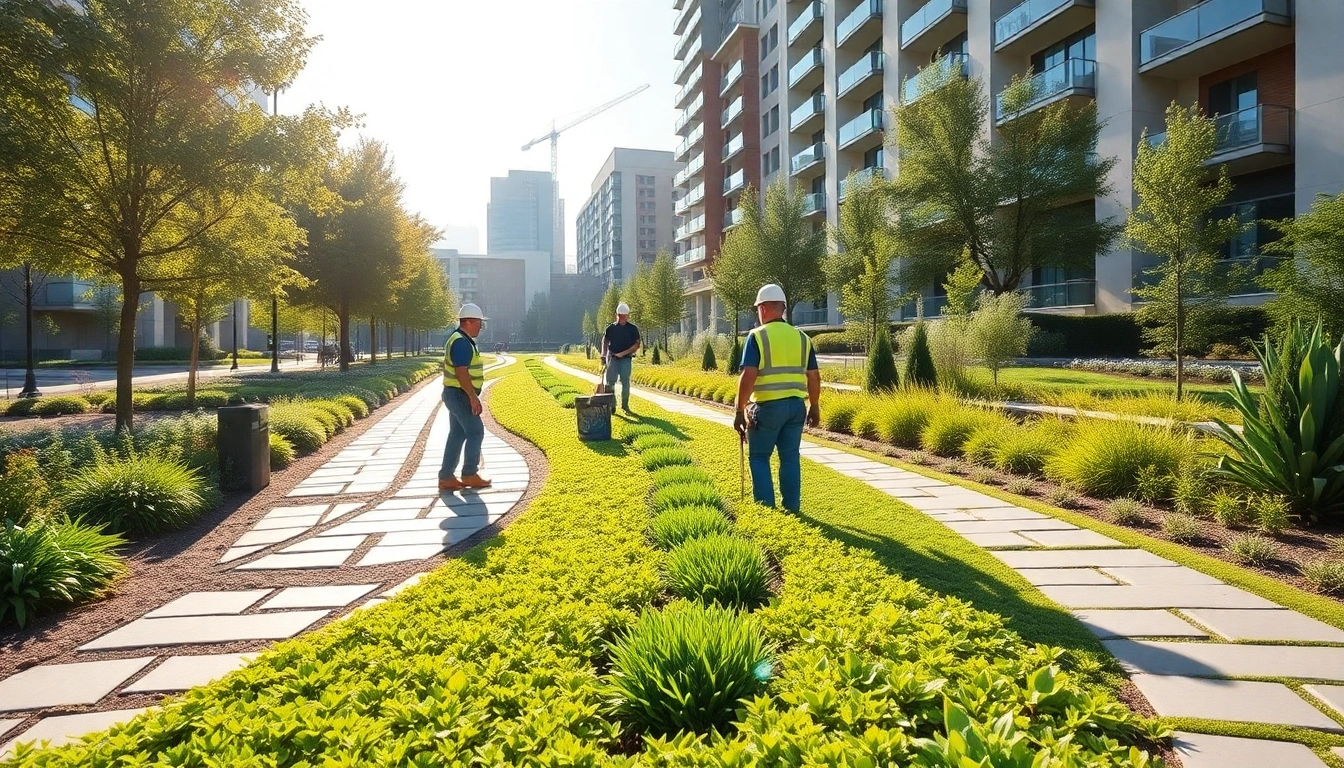Understanding the Role of Commercial Landscaping Contractors
In today’s competitive business environment, the exterior appearance of commercial properties carries significant weight in creating impressions. As a result, many businesses turn to commercial landscaping contractors to enhance their outdoor spaces. These professionals specialize in transforming landscapes into visually appealing areas that serve both aesthetic and functional purposes. From initial planning to ongoing maintenance, they play a vital role in ensuring that commercial properties are not only beautiful but also sustainable and fitting for their environments.
What Services Do They Provide?
Commercial landscaping contractors offer a comprehensive range of services tailored to meet the unique needs of businesses. These services typically include:
- Landscape Design: This involves creating custom landscaping plans that incorporate various elements like plants, trees, pathways, and water features to enhance the property’s aesthetic value.
- Installation: Once a design is finalized, contractors handle the installation of all landscaping components, ensuring that everything is set up correctly for optimal growth and visual appeal.
- Maintenance: Regular maintenance services, such as lawn care, pruning, fertilization, and pest management, are offered to keep landscapes looking pristine throughout the year.
- Irrigation Planning and Installation: Efficient watering systems are crucial for preserving the health of plants, so many contractors provide customized irrigation solutions.
- Seasonal Cleanup: This includes tasks such as removing leaves, debris, and dead plants to prepare landscapes for changes in seasons.
- Hardscaping: This service involves the installation of non-plant elements, such as patios, walkways, retaining walls, and outdoor lighting.
- Environmental Restoration: Some contractors specialize in restoring natural landscapes after events such as storms or development projects, focusing on sustainable practices.
Benefits of Hiring Professional Contractors
Engaging professional landscaping services comes with a plethora of benefits:
- Expert Knowledge: Experienced contractors bring industry knowledge and insight into the best practices for landscape design and maintenance, ensuring that the results exceed expectations.
- Time and Cost Efficiency: By outsourcing landscaping tasks, business owners can focus on their core operations, ultimately saving time and potential costs associated with trial-and-error on DIY projects.
- Access to Quality Materials: Professionals often have connections with suppliers, allowing them access to high-quality materials and plants that may not be readily available to the average consumer.
- Long-Term Viability: With a professional touch, landscapes can be designed not just for immediate attraction but also for long-lasting health and sustainability.
- Increased Property Value: Well-maintained landscapes contribute significantly to the overall value of a property, making it more appealing to potential buyers or tenants.
Common Misconceptions about Landscaping Services
Despite the evident benefits, some misconceptions about landscaping services may hinder businesses from engaging contractors. Let’s debunk a few of these myths:
- Landscaping is Only About Aesthetics: While improving appearance is a major focus, landscaping also involves horticultural science and environmental management to ensure functionality.
- All Contractors are the Same: Quality and expertise vary widely among contractors. Taking time to evaluate options can lead to significantly different results.
- DIY is Always Cheaper: While DIY may appear cost-effective, the potential for mistakes, safety issues, and poor design can lead to higher long-term costs.
- Maintenance Isn’t Necessary: Landscapes require ongoing care to remain healthy and appealing. Neglect can lead to higher restoration costs in the future.
Key Considerations When Selecting Contractors
Selecting the right landscaping contractor is crucial to achieving the desired results for your commercial property. Here are some key considerations to keep in mind when evaluating potential candidates:
Evaluating Experience and Credentials
Start by assessing the contractor’s experience and qualifications:
- Industry Experience: Look for contractors who have been in the industry for a significant amount of time and have dealt with projects similar to yours.
- Certifications and Licenses: Confirm that the contractor holds necessary licenses and any relevant certifications, such as those from the National Association of Landscape Professionals (NALP).
- Specialization: Some contractors might specialize in certain areas like sustainable landscaping or hardscaping, so it’s beneficial to find one whose expertise aligns with your project’s needs.
Assessing Portfolio and Past Projects
A strong portfolio is an excellent indicator of a contractor’s capabilities. Review their past work to determine their style and quality:
- Visual Appeal: Look for landscapes that reflect creativity and professionalism, ensuring they align with your vision.
- Variety: A diverse portfolio indicates that the contractor can cater to different styles and preferences.
- Before and After Examples: These provide a clear visual representation of the contractor’s ability to transform spaces.
Importance of References and Reviews
Gathering feedback from previous clients is one of the most reliable ways to gauge contractor performance:
- Client References: Ask for references and directly contact past clients to inquire about their experiences, focusing on quality, timeliness, and communication.
- Online Reviews: Utilize platforms like Google, Yelp, or social media to read feedback and reviews from previous clients to obtain a broader understanding of the contractor’s reputation.
- Play it Safe: Ensure to identify any recurring issues in the feedback. This can provide valuable insight that may influence your decision.
Contractor Selection Process
Once you have narrowed down your options, it’s time to engage with the contractors directly. This process should focus on gathering essential information to make a well-informed decision:
Creating a Clear Project Brief
Draft a project brief that outlines your vision, goals, and requirements:
- Define Objectives: Clearly state what you want to achieve, such as enhancing curb appeal, creating functional spaces, or improving sustainability.
- Set a Budget: Include budget constraints to ensure that proposals align with your financial capabilities.
- Specify Timelines: Clearly communicate deadlines and any critical milestones to keep the project on track.
Conducting Effective Interviews
Interviews are an excellent opportunity to understand each contractor better:
- Ask Targeted Questions: Inquire about their process, challenges they’ve faced in past projects, and how they measure success.
- Evaluate Communication Skills: Positive communication is essential for project success. Pay attention to how well they articulate their ideas and concerns.
- Discuss Custom Solutions: Determine if the contractor is prepared to provide tailored solutions that address your unique landscaping needs.
Understanding Pricing Models
Understanding how each contractor structures their pricing is critical:
- Transparent Estimates: Look for contractors who provide detailed cost breakdowns rather than vague estimates.
- Different Pricing Models: Familiarize yourself with various fee structures, including flat rates, hourly rates, or project-based pricing, to better compare options.
- Value Over Cost: While it’s essential to stay within budget, evaluate the overall value offered by each contractor, rather than just the price.
Best Practices for Managing Landscaping Projects
Once you’ve selected a contractor, efficient project management becomes key to achieving your goals:
Setting Clear Expectations and Timelines
Establish clear expectations right from the outset:
- Mutually Agree on Goals: Make sure that both you and the contractor clearly understand the project objectives.
- Timelines: Set realistic timelines and ensure everyone is on the same page regarding deadlines and deliverables.
- Flexibility: Be prepared for potential delays or changes in plans and maintain an open mind toward solutions.
Maintaining Open Communication
Facilitating consistent and clear communication is fundamental:
- Regular Updates: Schedule regular check-ins to discuss project progress, issues encountered, and milestones achieved.
- Crisis Management: Address any concerns or challenges as they arise to prevent misunderstandings and ensure a smooth workflow.
- Utilize Technology: Tools such as project management software can help keep communication transparent and organized.
Measuring Project Outcomes and Satisfaction
Finally, assessing the outcomes of your landscaping project is essential:
- Define Success Metrics: Determine what success looks like for your project. Will it be based on aesthetics, functionality, or both?
- Client Feedback: Solicit feedback from stakeholders to evaluate satisfaction levels and whether the project has met expectations.
- Long-Term Evaluation: Monitor the landscape over time to ensure maintenance practices are effective and that the design continues to meet needs.
Trends in Commercial Landscaping
As the landscaping industry evolves, several trends have emerged that professionals are incorporating into their projects:
Sustainability and Eco-Friendly Practices
With an increasing emphasis on environmental responsibility, sustainability has become a key focus in landscaping:
- Native Plant Species: Utilizing plants that are native to the region can greatly reduce water usage and promote biodiversity.
- Green Roofs and Walls: These structures not only add aesthetic appeal but also help to insulate buildings and reduce energy costs.
- Water Management: Innovative irrigation systems, like rainwater harvesting and drip irrigation, are being adopted to enhance efficiency and conserve resources.
Incorporating Technology into Landscaping
Technology is increasingly playing a role in landscaping:
- 3D Landscape Design Software: Allows for the visualization of projects before any work begins, ensuring all stakeholders can see the end product.
- Smart Irrigation Systems: Technologies that adjust watering based on weather conditions can result in improved water management.
- Drones and GIS: Used for surveying and monitoring large spaces, drones provide data that can optimize planning and maintenance practices.
Future-Proofing Your Outdoor Spaces
Creating landscapes that can withstand future trends and challenges is vital for long-term success:
- Flexible Design: Consider designs that can adapt to changing conditions and uses over time.
- Integrating Outdoor Workspaces: As more businesses embrace remote work, outdoor spaces must cater to flexible working conditions and wellness.
- Climate-Responsive Landscaping: Planning for climate change will help ensure that landscapes remain resilient against extreme weather events.



